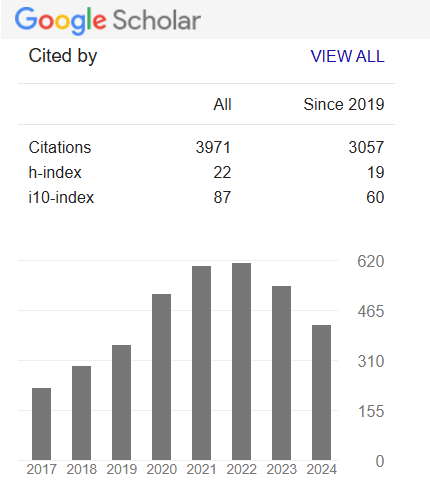Exopolysaccharide production and cholesterol reduction by Lactic Acid Bacteria isolated from traditionally fermented Indian foods
Keywords:
Fermented Foods, LAB, Cholesterol reduction, Probiotic, ExopolysaccharideAbstract
Excess cholesterol is a major risk factor for the development of hypercholesterolemia, cardiovascular heart disease (CVD), colon cancer, etc. There is a necessity of easy way to reduce serum cholesterol concentration. It can be deal by probiotics, prebiotics and synbiotics therapies. LAB are present in fermented foods and may have probiotic properties such as cholesterol reduction and exopolysaccharides (EPS) production. In the present study, we isolated a total of 20 isolates of LAB from diverse traditionally fermented Indian foods. The LAB were morphotyped and primary tests for probiotics done. All 20 isolates were found to be non-hemolytic and able to tolerate acid at pH 2.0. Six isolates were able to tolerate bile at 0.3%. Selected isolates were screened for cholesterol reduction property by testing BSH activity on MRS agar and quantitative estimation of cholesterol in growth medium was determined by enzymatic method. Five isolates exhibited cholesterol reduction activity which is in the range of 35 to 70%. Isolates were also screened for exopolysaccharide (EPS) production which can be considered as beneficial characteristics. Thus, the isolated organisms can be considered as a putative probiotic candidates having cholesterol reduction activity.
Downloads
References
Abedfar, A., and Hossininezhad, M. (2016) Overview of the most important characterization of exopolysaccharides produced by probiotics bacteria and their biological function. IOSR Journal of Envt. Sci, Toxicology and Food Tech., 10 (11): 47-55.
Albano C, Morandi T, Silvetti MC, Casiraghi FM, and Brasca M (2018) Lactic acid bacteria with cholesterol-lowering properties for dairy applications: In vitro and in situ activity. J. Dairy Sci, 101: 0807- 10818.
Choksi N. and Desai H (2012) Isolation, identification and characterization of lactic acid bacteria from dairy sludge sample. Journal of Environmental Research And Development, 7(1), 1-11.
Cruickshank R, Duguid J, Marmion B, Swain R, Medical Microbiology. 5 Ed, Vol.2, Churchill Livingstone Edinburgh London and New York Longman Group Limited, 87-88, 180-80.
Guan X, Xu Q, Yi Zheng Qian L, and Lin B (2017) Screening and characterization of lactic acid bacterial strains that produce fermented milk and reduce cholesterol level. Brazilian Journal of Microbiology 48,730-739.
Hosseini, S. V., Arlindo, S., Böhme, K., Fernández-No, C., Calo-Mata, P., and Barros-Velázquez, J. (2009) Molecular and probiotic characterization of bacteriocin-producing Enterococcus faecium strains isolated from nonfermented animal foods: Probiotic E. faecium strains. Journal of Applied Microbiology, 107(4), 1392–1403. https://doi.org/10.1111/j.1365-2672.2009.04327.x.
Jamaly N, Benjouad A , and Bouksaim A (2011). Probiotic Potential of Lactobacillus strains Isolated from Known Popular Traditional Moroccan Dairy Products. British Microbiology Research Journal.1(4):79-94.
Kim, Y., Whang, J. Y., Whang, K. Y., Oh, S., and Kim, S. H (2008). Characterization of the Cholesterol-Reducing Activity in a Cell-Free Supernatant of Lactobacillus acidophilus ATCC 43121. Bioscience, Biotechnology, and Biochemistry, 72(6), 1483–1490. https://doi.org/10.1271/bbb.70802.
Lim, H. J., Kim, S. Y., and Lee, and W. K (2004). Isolation of cholesterol-lowering lactic acid bacteria from human intestine for probiotic use. Journal of Veterinary Science, 5(4), 391. https://doi.org/10.4142/jvs.2004.5.4.391.
Madiedo PR, Gavilan CGR. (2005) Invited review: Methods for the screening, isolation, and characterization of exopolysaccharides produced by Lactic acid bacteria. Journal of Dairy Science, 88:843-56.
Patel, A., Lindström, C., Patel, A., Prajapati, J. B., and Holst, O (2012). Probiotic properties of exopolysaccharide producing lactic acid bacteria isolated from vegetables and traditional Indian fermented foods. International Journal of Fermented Foods, 1 (1): 87-101.
Shehata MG, Sohaimy SAE, EL- Sahn AME, and Youssef MM (2016) Screening of isolated potential probiotic lactic acid bacteria for cholesterol lowering property and bile salt hydrolase activity. Annals of Agricultural Science, 61(1), 65–75.
Tamang, J. P., Watanabe, K., and Holzapfel, W. H (2016) Review: Diversity of Microorganisms in Global Fermented Foods and Beverages. Frontiers in Microbiology, 7. https://doi.org/10.3389/fmicb.2016.00377.
Tok, E., and Aslim, B. (2010). Cholesterol removal by some lactic acid bacteria that can be used as probiotic. Microbiology and Immunology, 54:257-264. https://doi.org/10.1111/j.1348-0421.2010.00219.x.
Tokat M, Gulgor g, Elmac B, and Gleyen NA (2015) In VitroProperties of Potential Probiotic Indigenous LacticAcid Bacteria Originating from Traditional Pickles. BioMedical Research International: 1-8. doi.org/10.1155/2015/315819.
Tomaro-Duchesneau, C., Jones, M. L., Shah, D., Jain, P., Saha, S., and Prakash, S. (2014). Cholesterol Assimilation by Lactobacillus Probiotic Bacteria: An In Vitro Investigation. BioMed Research International, 2014, 1–9. https://doi.org/10.1155/2014/380316.
Wang, S. C., Chang, C. K., Chan, S. C., Shieh, J. S., Chiu, C. K., and Duh, P.-D. (2014). Effects of lactic acid bacteria isolated from fermented mustard on lowering cholesterol. Asian Pacific Journal of Tropical Biomedicine, 4(7), 523–528. https://doi.org/10.12980/APJTB.4.201414B54.
Wu CC, Weng WL, Lai WL, Tsai HP, Liu WH, Lee MH and Tsai YC (2015) Effect of Lactobacillus plantarum strain K21 on high-fat diet-fed obese mice. Evidence-Based Complementary and Alternative Medicine, 1-9. doi.org/10.1155/2015/391767.
Downloads
Published
How to Cite
Issue
Section
License
Copyright (c) 2021 Gosavi Jyotsna, Shingade Sujata, Walhe Rajan Walhe

This work is licensed under a Creative Commons Attribution-NonCommercial-NoDerivatives 4.0 International License.
Open Access This article is licensed under a Creative Commons Attribution 4.0 International License, which permits use, sharing, adaptation, distribution and reproduction in any medium or format, as long as you give appropriate credit to the original author(s) and the source, provide a link to the Creative Commons license, and indicate if changes were made. The images or other third party material in this article are included in the article’s Creative Commons license unless indicated otherwise in a credit line to the material. If the material is not included in the article’s Creative Commons license and your intended use is not permitted by statutory regulation or exceeds the permitted use, you will need to obtain permission directly from the copyright holder. To view a copy of this license, visit http://creativecommons.org/ licenses/by/4.0/











